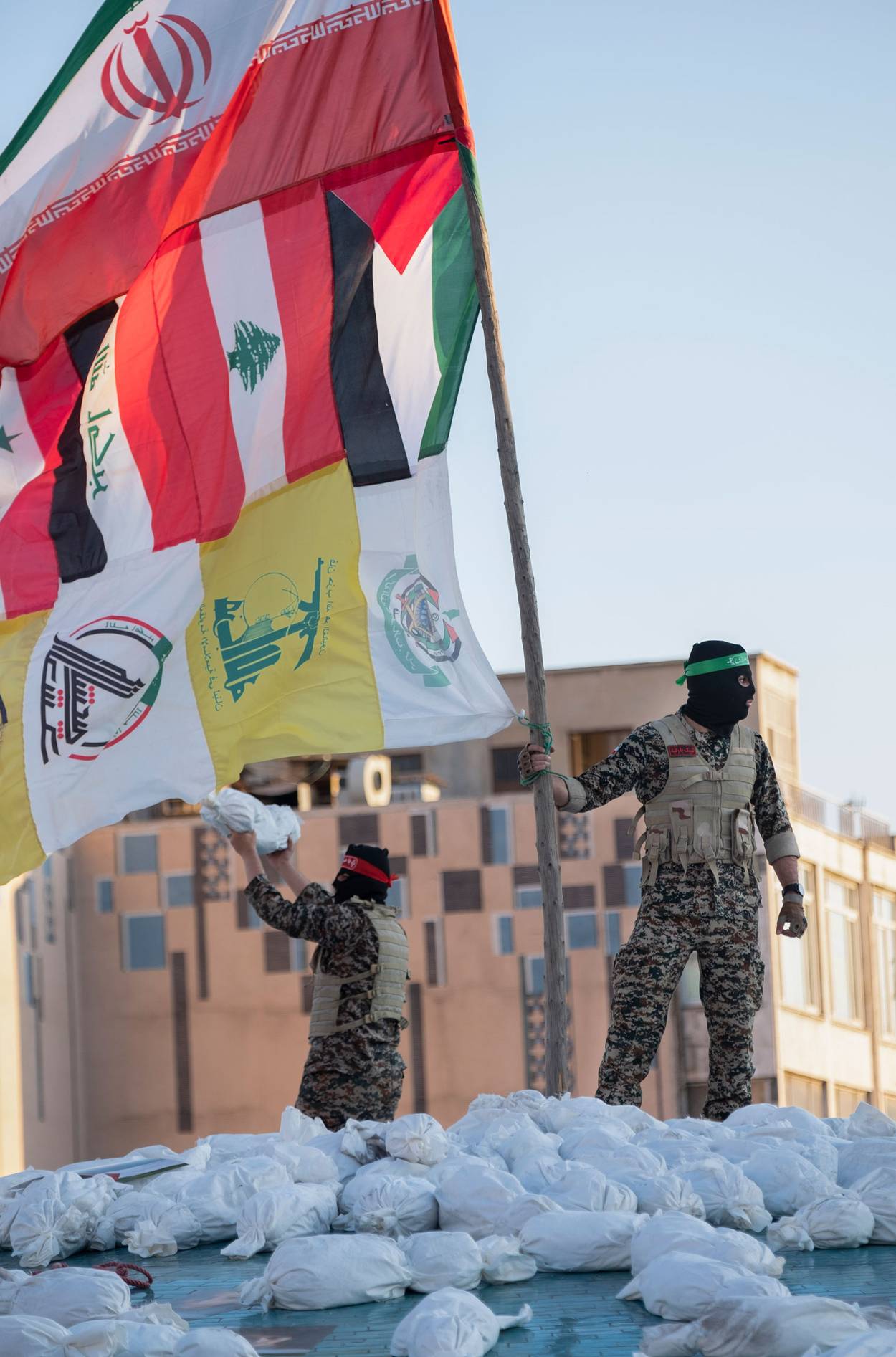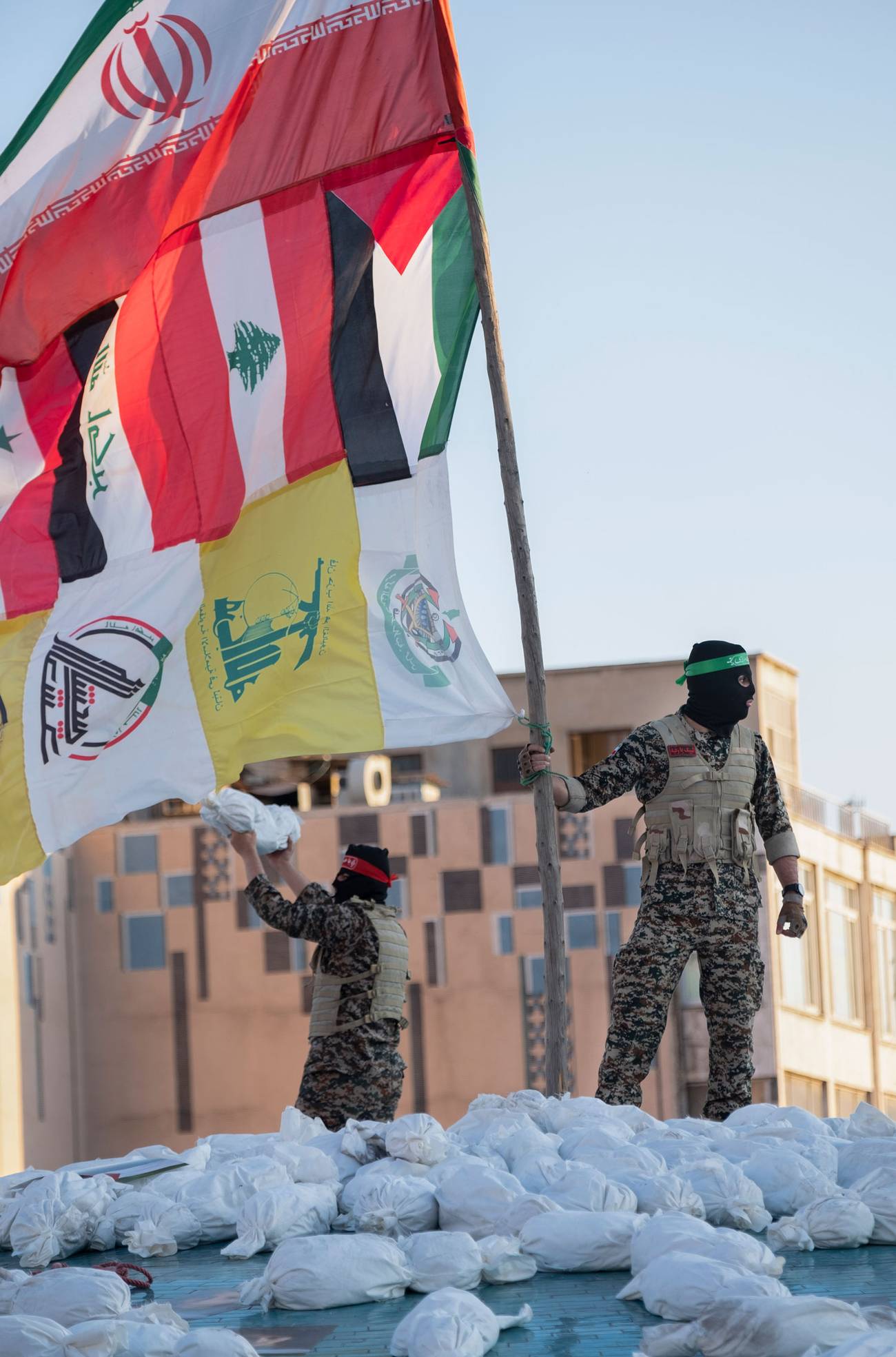Iran’s Implausible Deniability
The terror state and its various proxy militias—including Hamas—are obviously acting in concert. Why won’t the U.S. admit it?

Morteza Nikoubazl/NurPhoto via Getty Images

Morteza Nikoubazl/NurPhoto via Getty Images

Morteza Nikoubazl/NurPhoto via Getty Images

Morteza Nikoubazl/NurPhoto via Getty Images
The Biden administration came into office with the pledge to take the U.S. off a “war footing” with Iran, which the incoming team said had characterized the term of its predecessor. “De-escalation,” as the administration called it, is the way we would achieve peace in the region. Tehran would not be held to account for its malign activities, whether they were conducted directly or through its extensive regional network of proxies. If anything, the Biden team telegraphed, Iran would be rewarded.
As recently as September, the administration was congratulating itself on its approach: “the Middle East region is quieter today than it has been in two decades,” National Security Adviser Jake Sullivan famously declared. The slaughter of at least 1,200 Israelis, and more than 30 Americans, at the hands of Iranian proxies has not made a dent in the administration’s worldview. On the contrary, the White House’s overriding concern over the last month has been to artificially distance Iran from the Oct. 7 massacre and the subsequent attacks on U.S. bases and personnel in the region.
The separation is absurd on its face. This year alone, before and after Oct. 7, there have been dozens of meetings, in Lebanon and Iran, between Hamas, Hezbollah, Palestinian Islamic Jihad (PIJ), and the Iranian command. These groups, in addition to the Houthis in Yemen, and a host of Iraqi Shiite militias all belong to what they call the “axis of resistance.” The axis is an Iranian creation: ideologically, financially, operationally, and strategically. Iran is the state power that undergirds this network of armed groups, providing them with funds, weapons, and guidance in the service of Iranian geopolitical interests. Tehran does not merely back these militias. To a huge degree, it controls them.
By obfuscating Iran’s role, the Biden administration is validating Tehran’s regional strategy, thereby shielding it against retaliation.
And yet, the administration has been at pains to deny Iran’s involvement in the Oct. 7 massacre, pushing back against a series of media reports that highlighted Iran’s role in the planning, training, and timing of the attack. The reports make clear that coordination between Iran and its so-called “joint operations room” in Lebanon (which includes Hamas, Hezbollah and PIJ) was constant, a fact made evident by the frequent visits to Beirut by top Iranian officials, especially Esmail Qaani, commander of the Revolutionary Guard’s (IRGC) Quds Force, in the months and weeks before Oct. 7. Hamas and PIJ leaders like Saleh al-Arouri and Ziad Nakhaleh, both of whom are based in Lebanon under Hezbollah’s protection, held regular meetings in Beirut and in Tehran with Hezbollah’s Secretary General Hassan Nasrallah and the Iranian leadership.
Since then, Tehran’s direct involvement has been even more visible. Qaani has been in Lebanon almost continuously since Oct. 8, overseeing the joint operations room. But none of that matters to the Biden administration. When asked about Iranian communication with Hezbollah during the ongoing attacks on Israel from south Lebanon, National Security Council spokesman John Kirby said he wasn’t “aware of anything overt.” Apparently, the commander of the Quds Force camping out in Lebanon for the past month doesn’t count.
To justify this posture toward Iran, administration officials insist they are preventing a “broader regional escalation” which would encompass Iran and Hezbollah, and thereby draw in the U.S., endangering American personnel in the region. The problem is that, since Oct. 17, Iranian-controlled militias have conducted more than 60 attacks against U.S. bases in Iraq and Syria. At least 62 American soldiers have been injured in these attacks.
It should come as no surprise that the Iranians have primarily targeted American forces. Iran views Israel as an American proxy: Take away American backing and Israel collapses. Hence, while most observers have been focused on the possibility of Iranian action against Israel, Iran’s strategy has been to turn up the heat on the United States, in order achieve the objective of forcing a permanent cease-fire in Gaza. That would entail Hamas’ survival, and, consequently, a humiliating defeat for Israel. Iran also wants Washington to restrain Israeli action against Hezbollah, which is Tehran’s main point of leverage over Jerusalem.
It’s a risky proposition for Iran to target the U.S. itself. Regional proxies offer Iran a degree of separation. This façade—known as “plausible deniability”—allows Iran to wage cost-free proxy warfare. But for it to work, the U.S. must play along and subscribe to the fiction that Iran and the militias it arms, funds, and trains are totally distinct.
By obfuscating Iran’s role, the Biden administration is validating Tehran’s regional strategy, thereby shielding it and its key assets against retaliation. Hence, Washington has publicized its opposition to any Israeli “preemptive strike” against Hezbollah in Lebanon. President Biden has sent his special envoy, Amos Hochstein, to Israel and Lebanon to confirm that Beirut enjoyed an American protective umbrella. The administration also signaled that it would hold Israel responsible for any conflagration in the north, leaking that Israel was “trying to provoke” Hezbollah. Should that happen, the administration was hinting, Israel would be blamed for any subsequent attacks on U.S. assets.
The White House publicly demonstrating that it can curb Israeli action against Iranian interests validates Iran’s view of Israel as an American proxy. At the same time, the administration reserves the right to be selective in its approach to Iran’s proxies—but always in a manner that benefits Tehran. On the one hand, the Biden team signals its commitment to Iranian interests in Lebanon by shielding Hezbollah’s base of operations from any Israeli action. On the other hand, when Shiite militias attack U.S. bases and personnel in Syria and Iraq, the administration upholds the fictional distinction between these groups and Iran. Whenever it retaliates, the U.S. only strikes the militiamen and their facilities. Iran is off-limits. And even then, the administration is quick to reassure Iran that it was acting only in “self-defense” using “discrete, precision strikes,” and that U.S. action is “separate and distinct” from Israel’s war in Gaza. At a recent briefing, Kirby was asked if containment of Iran was working. The NSC spokesman rejected the term itself: “we wouldn’t associate ourselves with the word containment.”
True to form, Tehran is rubbing it in. The head of the IRGC’s aerospace wing, Amir-Ali Hajizadeh, mocked the administration saying: “The Americans don’t threaten us.” Instead, “They sometimes have three rounds of correspondence with Iran in one night … all in a tone of begging.” The administration’s weak, pleading language suggests he might be telling the truth.
Jay Mens is Ernest May Fellow for History and Policy at Harvard Kennedy School and a Senior Fellow at Policy Exchange, a British think tank.